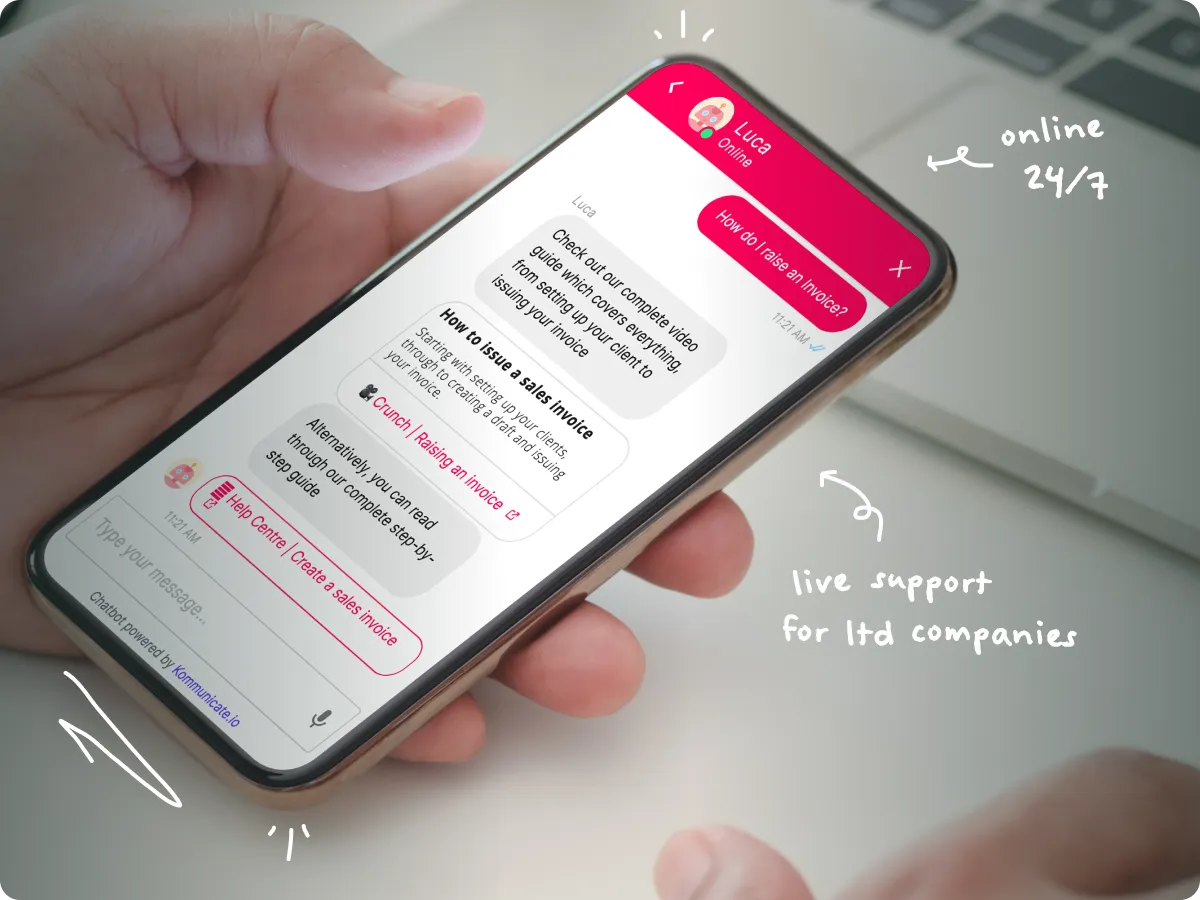If you’re considering becoming self-employed, or you’ve already embarked on your ‘be your own boss’ journey, you need to make sure you keep accurate accounts to stay on top of your tax obligations.
Keeping accounts essentially means collecting a record of all of your financial transactions, though exactly what kind of information you record will depend on you and your business. HMRC doesn’t impose any rules on how you keep records, but they must be accurate, complete and readable.
In the context of this article, self-employment means you’re a sole trader or in a partnership. Whilst the owners of a limited business are technically self-employed too, they have to keep and prepare accounts using a different process.
Self-employment is an exciting idea, but it does mean having to manage all of the business responsibilities on your own. Collecting, formatting and storing your accounting information is an added burden – but there are digital tools like Crunch available to help make your life easier.
In this guide, we’ll walk you through the concept of accurate accounting for self-employed people. We’ll cover both of the methods you can choose to help you decide between cash and accruals basis, how to record and store information accurately and how your records can be used to streamline the tax process.
Don’t let confusion around accounting hold you back from pursuing your dreams. Take a quick read through this guide and become a self-employed accounting expert!
{{pt-self-assessment}}
Why do self-employed people need to prepare accounts?
While people often confuse their accounts with their tax returns, the two are actually different processes. You usually don’t need to send your records to HMRC; instead, you’ll submit a tax return.
However, you’ll need your records to calculate your profit and loss for that tax return. You must also store them securely to ensure HMRC can see them if they need to investigate any part of your business.
Aside from tax reporting, maintaining prepared accounts gives you much more visibility over your business’s financial performance, allowing you to make more informed decisions about running your business, hiring new employees or taking on new clients.
What self-employed accounts do you need to keep?
Self-employed people need to keep track of all business income and expenses – as well as keep a separate record of any personal income. If you’re the nominated partner in a partnership, you have to keep additional records for the partnership, too.
The amount and type of records you need to keep will depend on the exact nature of your business, but HMRC sets the following as the minimum requirements:
- All business sales and income
- All expenses incurred within the business
- VAT records, if eligible
- PAYE if you have employees
- Records of all personal income
- Any business grants
These guidelines serve as the minimum requirements – but they don’t really tell you what and how you need to track these figures. We’ve broken each section down to try and make things clearer:
- Business sales and income: record all of the sales and income made by your business. Collect all bank statements, invoices and paying-in slips as receipts to help keep your records as accurate as possible.
- Expenses: Record all payments and purchases you make for the business, making sure you keep receipts every time. If you purchase business assets from your personal bank, you should still record it and keep a receipt.
- Some purchases won’t be classed as allowable expenses – but for the purpose of preparing accounts, we’d suggest simply recording everything and then working out allowable ones when it’s time to submit your tax return.
- Personal income: record any personal income that falls outside of business income, which is information you’ll later need to provide in your self-assessment tax return.
- VAT records: If your turnover is more than the VAT threshold (currently £85,000 as of 2023/24), you must register for VAT and keep all related records for at least six years. See our guide to VAT for sole traders to learn more.
- PAYE records: if you have any employees, you should keep a record of payments you make to them via PAYE or any other system.
- Grants and schemes: if you’ve received any business grants or you’re part of a financial support scheme, you need to keep records of funds received.
Legally, you need to keep records for at least five years after each tax submission deadline, so you’ll need to use a reliable cloud-based system that allows you to recover any records when you need them.
Cash accounting versus accruals
As if life as a self-employed person wasn’t complex enough, there are actually two different systems under which you can prepare your accounts. When starting out as a sole trader, you’ll need to not only get to grips with which records you need to keep, but also whether you want to use cash basis or accruals accounting.
As standard, most businesses use accruals with the option to use cash if you’re a sole trader generating less than £150,000 in revenue. However, things will change as of the 2024/25 tax year – cash basis accounting will become the new standard practice for sole traders and the self-employed.
Cash basis accounting
Overview: In this system, you only record your income and expenses when you receive money or pay your bills. For example, if you were to sell products to a supplier in August but they didn’t pay their bill until September, you would only record the revenue in the month it was received.
Criteria: available to sole traders or partners in small businesses with an income of less than £150,000.
Pros:
- Easier to prepare, since there’s no need for year-end adjustments to account for debtors and creditors
- Less burden on cashflow as you don’t have to pay tax on any income you haven’t actually received
- You don’t have to make adjustments for capital allowances, as any reliefs will be applied as soon as you make the purchase
- Losses can be offset against future profits
Cons:
- Cash accounting can cause false ‘readings’ in regard to profitability. Your company can appear profitable just because you haven’t yet paid a large outstanding bill
- No long-term view of finances to make management decisions
Accruals accounting (also known as ‘traditional accounting’)
Overview: Under accruals, you record income and payments as soon as you send an invoice or receive a bill. Expenses are accounted for immediately, rather than when the actual cash transaction occurs.
Criteria: The default option for most businesses, including limited companies that cannot access cash-based accounting.
Pros:
- Gives you a better view of your overall financial health to facilitate stronger forward planning
- Late payments and disputes with suppliers won’t affect your overall accounts or finances from a tax perspective
- Preferred method by most financers
Cons:
- Requires better tracking as revenue is based on invoices and bills rather than cash in your bank
- May need to pay tax on income before you are paid by your customer
Cash vs accruals: which is best for self-employed people?
For the purposes of this guide, we’d say that most sole traders are better served by cash basis accounting for the simplicity it provides. However, if you anticipate your earnings threshold to rise above the £150,000 mark quickly or you’d like to have more control over your financial planning, it’s worth considering accruals.
Fortunately, you can switch between the systems if you’re eligible. However, switching requires forward planning and attention to detail to avoid making mistakes. Talk to Crunch if you need to switch, and our team can help.
As a third option, some businesses use cash basis and accruals in a hybrid model. Under this system, day-to-day records are done via cash, but longer-term financial plans are built using accruals.
Initial setup for self-employed accounting
So you know what you need to record for your accounts and have a rough idea of which system you might use. Now it’s time to get started! But wait – are you even registered as a sole trader yet?
Getting set up as a sole trader is fairly simple – all it requires is that you register for self-assessment with HMRC. To get started with trading, however, you should also open a business bank account and register a business name and website.
Read our guide to setting up as a sole trader, which takes you through every step of the process.
Once you have a business bank account, you can start recording your financial information for your accounts. You can do this manually, though you might quickly realise why so many sole traders choose accountants or accountancy software to help them with their bookkeeping and accounts prep!
If you’re interested in preparing accounts yourself, you’ll need to know which type of information you need to record.
Recording transactions: income and expenses
Bookkeeping in your business is all about creating a clear picture of your financial transactions – including all sales, income and expenses.
HMRC demands that you keep proof for all business transactions, including receipts for goods or stock, bank statements or chequebook slips for payments and sales invoices.
While some may use a free system like Google Sheets to note information, it’s usually better to choose a dedicated bookkeeping or accountancy platform because they allow you to store records and associated documentation (receipts, bills, invoices, etc.) in one secure place.
Some basic tips for recording transactions include:
- Begin recording transactions from day one in your business – note down all sales, income and expenses as dictated by your chosen accounting system (cash vs accruals). Use accurate dates at all times.
- When making a record include the associated receipt or invoice against the transaction.
- When recording expenses, split them by type if you can, so you’ll later be able to filter them and see if you’re spending more on client entertainment, fuel, tools, etc.
- Keep all records for six years to maintain full accountability in the eyes of HMRC and any other potential investigations.
Recording all of this information not only helps you build a better picture of your overall finances, but will also be essential when it’s time to complete your self-assessment.
Taxes and deductions
As a self-employed individual, you will calculate your tax obligations via a process known as self-assessment. This process involves providing HMRC with the information you’ve kept as part of your self-employed accounts.
A key part of the self-assessment process, which you can do ahead of time to plan your tax obligations better, is to deduct allowable expenses from your total income. This leaves you with your ‘taxable income’.
Depending on your taxable income and other factors, you may have to pay any of the following:
- Income tax: if your business earnings are higher than the personal allowance (£12,570 in 2023/24) after any allowable deductions are made, you’ll be eligible for income tax. The rate of repayment depends on how much income you’ve made:
- Less than £12,570: No tax payable
- £12,571 to £50,270: 20%
- £50,271 to £125,139: 40%
- More than £125,140: 45%
- National insurance contributions: depending on your taxable income figure, you may have to pay Class 2 and Class 4 National Insurance contributions. See our guide to National Insurance for the self-employed here.
- VAT: if your business earnings put you above the VAT threshold (£85,000), you must register and charge for VAT (usually 20%). Record all VAT you collect on sales as output VAT and any VAT you pay as input. This will be used to calculate your VAT repayment burden.
How long should a self-employed person keep records?
As standard practice, aim to keep records for at least five years. To be on the safe side, we’d recommend extending that to six to ensure you don’t have any gaps between tax years. All of your accounts and records should be stored safely and backed up using whichever system you choose.
In the past, records were often stored physically in an office and then recorded digitally on a computer’s hard drive. Thanks to the advent of the internet and cloud computing, there are more reliable ways to store data. Most modern sole traders utilise accountancy software that keeps your accounts in the cloud, so you have safe backups no matter where you are.
Leveraging technology: accountancy software and tools
Keeping records is just a standard part of running a business, but it eats into your time and can quickly trip you up. Imagine, for example, you use Microsoft Excel to track expenses and then forget to attach receipts before they are accidentally deleted.
Preparing accounts is too important to get wrong, which is why many self-employed people opt to use accounting software to help them make records, track expenses, and prepare for tax reporting.
When selecting self-employed accounting software, there are many different tools and options to choose from. For most sole traders, the best option is a system that takes care of the basics and offers direct support whenever you need it. All of the bells and whistles are largely wasted if you can’t get help when you’re feeling stuck.
CrunchOne, our own accounting software solution, is built specifically for sole traders and gives you a reliable way to record and store all of your accounting information – but it also gives you direct support from real UK accountants whenever you need it. Not only do we help you keep records, but our Self-assessment service also prepares and files for you.
If you’re ready to start your self-employment journey, do it from day one with the right tool at your side. As you start to build your income and grow your business, we’ll be here to help keep you on the right track with all things accounting, tax and even financial forecasting. Click here to give it a go.
.svg)

.jpg)



.jpeg)
.jpeg)






